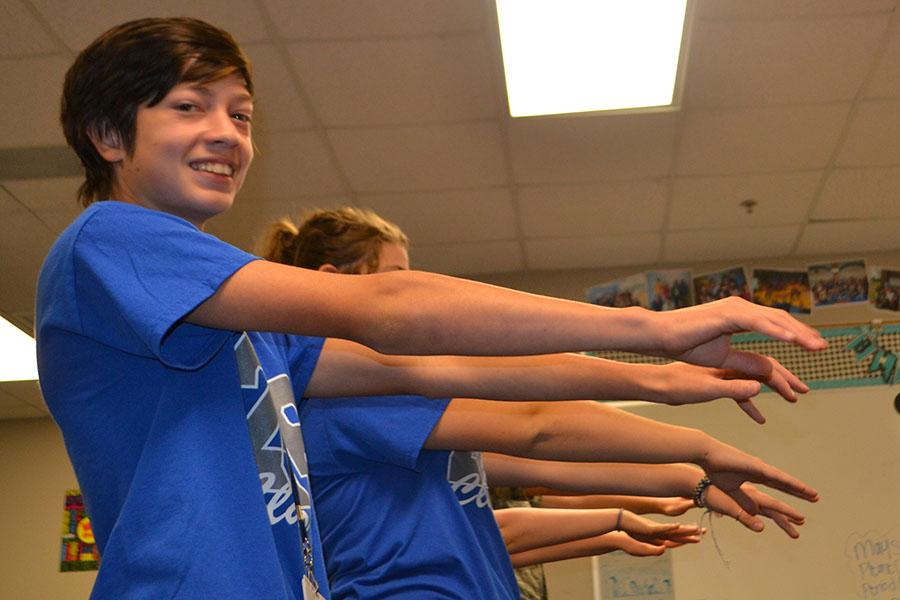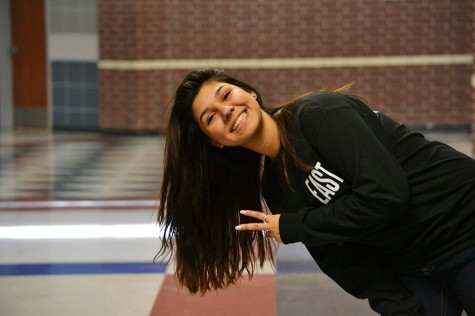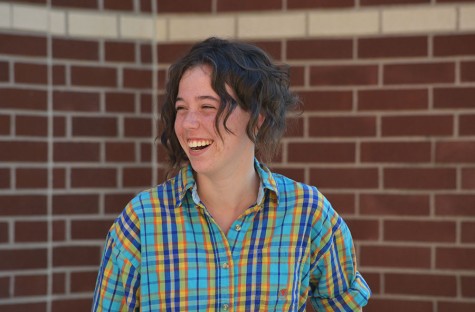Students find ways to overcome burdens
photo credit: Lauren West
Hear to stay \\ Freshman Luke Pendley practices the Raider Rumble with his yearbook staff. He is completely deaf in his right ear.
October 27, 2014
Turn a deaf ear
Freshman Pendley endures legally deaf right ear
by Brooke Vincent
Students walk through the halls listening to music with a headphone bud in each ear, however one student in particular is unable to enjoy the surround sound. Freshman Luke Pendley is legally deaf in his right ear, making every day activities just a little more difficult.
During third grade, Pendley failed multiple hearing tests leading him to visit his ears, nose and throat specialist who discovered something behind his ear drum.
“I was then sent to a specialist, Dr. Peters,” Pendley said. “It happened to be a tumor growing, I had surgery that following month. After many surgeries [after that] they got the tumor removed, but I lost all hearing in my right ear.”
After waking up from surgery, Pendley was shocked at the realization that he was unable to hear out of his right ear. Although he knew this would be a downside to the surgeries, Pendley still had to work on working out the challenges he would face on a day to day basis.
“During school I miss a couple things during class and sometimes don’t hear my name called when people try to talk to me,” Pendley said. “I can participate in mainly every activity, but for about two months after surgery I’m out of everything that’s active.”
The only true solution to his hearing problem is for Pendley to try and sit in the front of the class, paying attention to the teacher.
“[My hearing] should get better through more surgeries,” Pendley said. “Other than that I just have to make smart choices.”
October may be National Disability Awareness month, but these students deal with in-capabilities year round.
Student deals with dryness
by Elena Pritchett
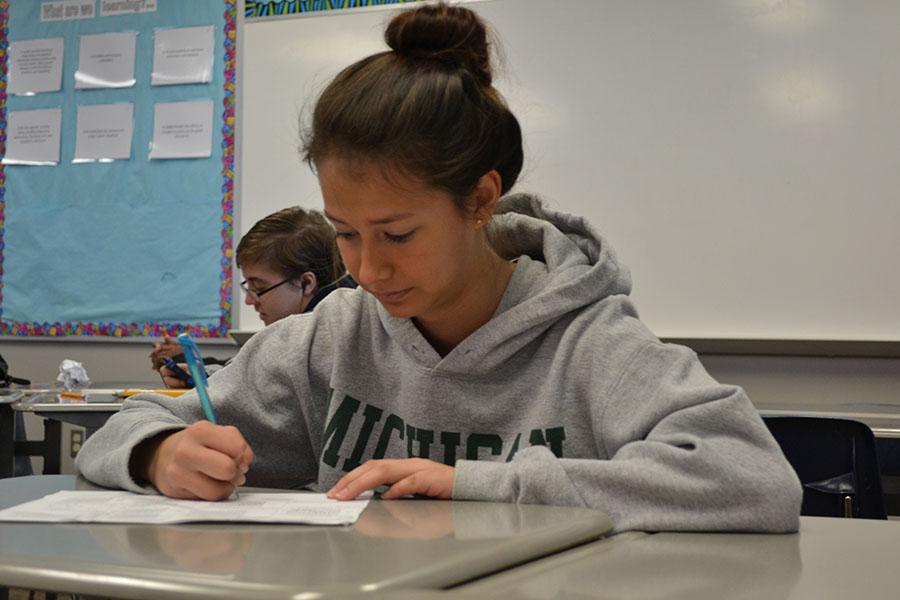
Parched person \\ Freshman Mariah Pritchett has Sjogren’s syndrome, a disorder of the immune system causing her to have dry eyes and a dry mouth.
Sjogren’s syndrome is a disorder of the immune system identified by its two most common symptoms, dry eyes and a dry mouth.
According to the Mayo Clinic, it often accompanies other immune system disorders, such as rheumatoid arthritis and lupus. Although anyone can develop Sjogren’s syndrome at any age, most people are older than 40 at the time of diagnosis. The condition is most common in women.
According to freshman Mariah Pritchett, it is not bad to be living with this disease.
“I found out I was diagnosed this year in February. My eyes and mouth are always dry so I have to constantly put in eye drops,” Pritchett said.
In Sjogren’s syndrome, the mucous membranes and moisture-secreting glands of the eyes and mouth are usually affected first, resulting in decreased production of tears and saliva.
“One of the things I can’t do is drink soda. I’m always sore too and I have to take pills. If I don’t, it could damage my heart and lungs,” Pritchett said.
Facing dyslexia
Freshman McCulloch sees numbers and letters all mixed up
by Caisey Plunk
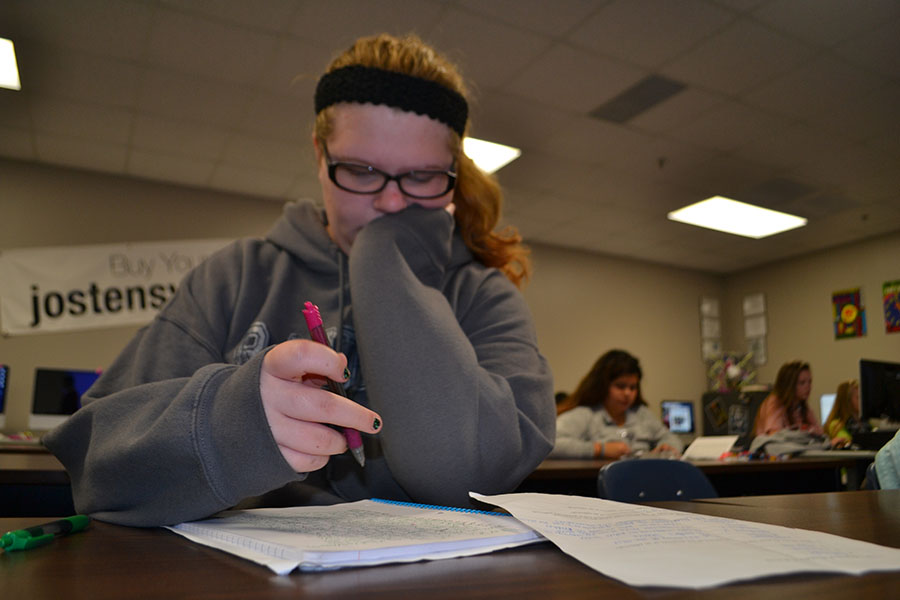
All mixed up \\ Diagnosed with dyslexia at the age of four, freshman Cali McCulloch has to reread text often.
Freshman Cali McCulloch was diagnosed with Dyslexia at the age of four.
McCulloch would always mix words and letters up when she was reading out loud.
“I would mix up letters like p and q and some words when I read things out loud,” McCulloch said.
She faced obstacles like trying to read out loud in class.
In school McCulloch has to read things twice to make sure she read it correctly.
“If I don’t read it twice I fail things like quizzes and tests,” McCulloch said.
When McCulloch was younger she would always be on the lower reading levels.
When her family found out about her Dyslexia her dad denied that Cali had something wrong with her. Her mom was accepting that Cali had Dyslexia.
McCulloch reads more books now to improve her reading skills. Now it is easier for her than when she was younger.
Banks can’t tell
Freshman Banks has trouble with letters
by Maria Restrepo
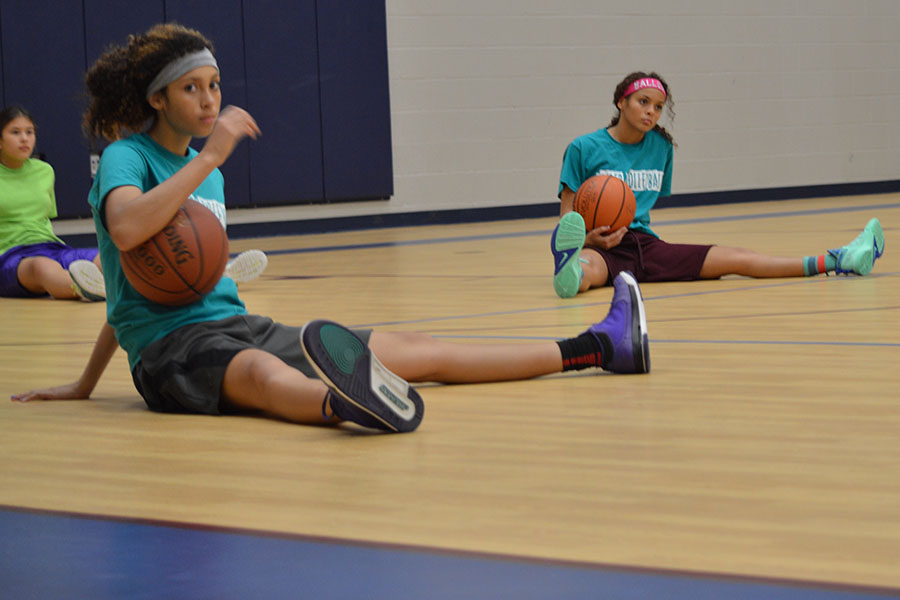
lAl mxedi up \\ Freshman basketball player Sierra Banks does a double take when reading. “I just try and try again every time I don’t get something,” Banks said.
Words and phrases are jumbled, numbers are a mess. Freshman Sierra Banks has a condition just like dyslexia. A condition which makes her do a double take on everything.
“There can be a piece of paper with 26 written on it, but I will look at it and read 62,” Banks said, “Other times, while I read, I add in words that aren’t there and the whole sentence will make no sense.”
Banks was diagnosed in seventh grade. From reading an assignment numerous times, to going to tutorials, Banks knows the struggle is real.
“In seventh grade, I was doing homework and my Mom was helping,” she said, “I read something wrong and said, ‘I’m so stupid’. My Mom said ‘No you’re not stupid, you just read things wrong.’”
Her Mom later made an appointment with a friend who had the same disability.
“I went to this lady and she started telling me why I didn’t understand. Now, at least I know what’s wrong with me,” Banks said.
Banks insists she needs no help in school. She manages to keep her grades up even while playing volleyball and basketball.
When she gets older, Banks plans to graduate high school and college and play in the Women’s National Basketball Association.
“I just try and try again every time I don’t get something,” Banks said.
Freshman Mackey attributes friends, family with overcoming dyslexia
by Allie Dorsey
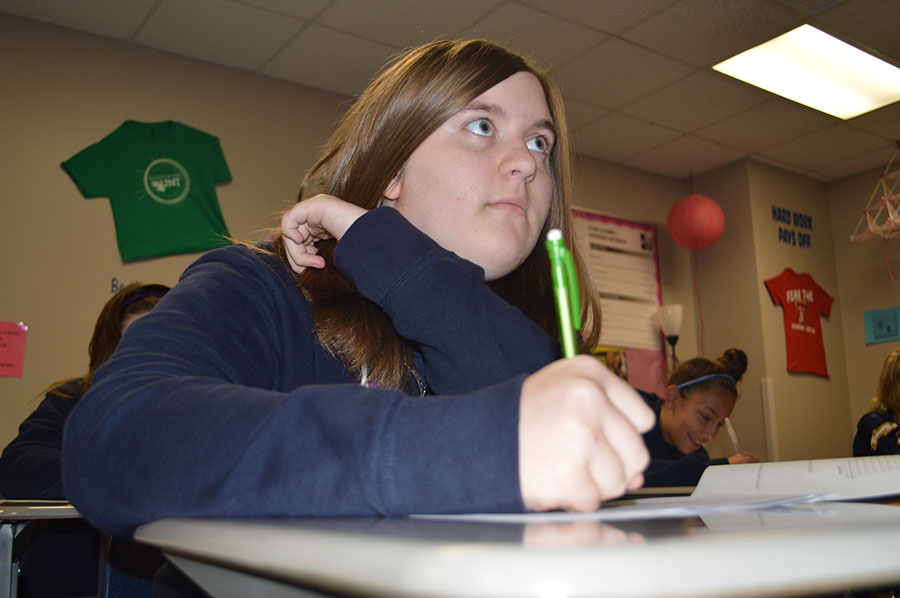
Dissing dyslexia \\ Reading is a constant struggle for freshman Mikayla Mackey.
“Even though I have a tough time reading, that doesn’t stop me from enjoying books such as ‘The Hunger Games’ or ‘Maze Runner,'” Mackey said.
Freshman Mikayla Mackey, struggles with dyslexia causing her reading and writing to be constant struggles everyday.
“Even though I have a tough time reading, that doesn’t stop me from enjoying books such as ‘The Hunger Games’ or ‘Maze Runner,'” Mackey said.
She is inspired to keep going so she does not get left behind by her friends.
“I have several friends, who challenge me so I stay on my toes and it’s thanks to them that I haven’t given up. My parents are also a big part, they keep me on track with my school work,” Mackey said.
Mackey’s career path is to be a Marine Biologist. This has put her in an AP Biology class, her workload is stressful but she has managed.
“We learn at a faster pace. It can be really difficult sometimes but I always have my teacher if I need help,” Mackey said.
Mackey keeps her head held high when she is going through a tough time.
“I really hope to overcome this difficult challenge in life,” Mackey said. “Once high school is over I’ll be able to keep my head above water. School is a short period of time, and if I can get through that, I believe I can do anything.”


